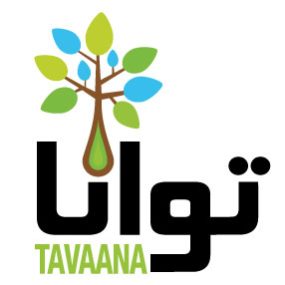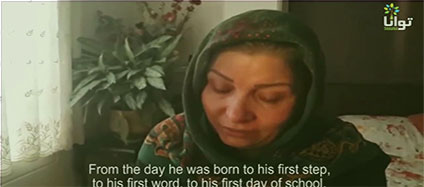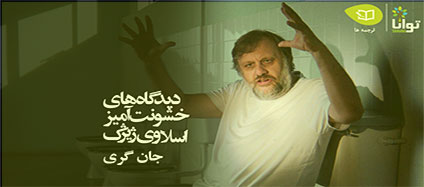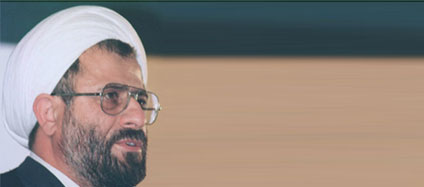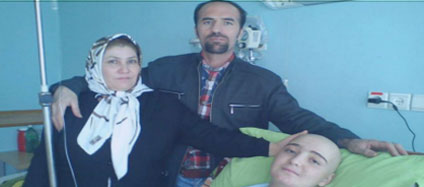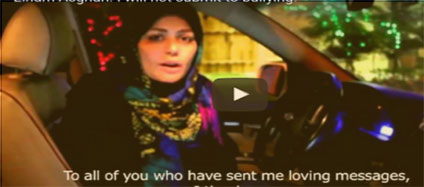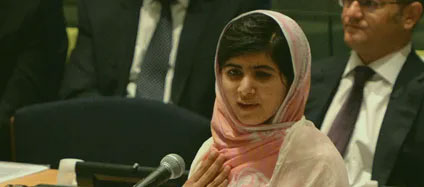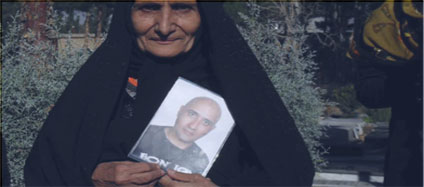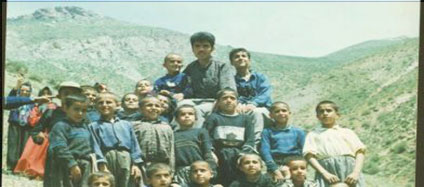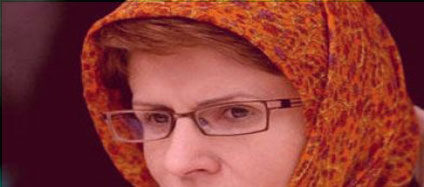Nourizad and Artin
On July 15, 2013, Mohammad Nourizad, a former hardliner and journalist who later became an outspoken critic of the Iranian government, visited the home of the Rahimian family. Kamran Rahimian and wife Faran Hesami are Baha’i educators who were jailed for teaching oft-persecuted fellow Baha’is at an underground university (members of the religion, viewed as heretics by the ruling Shi’a establishment, are officially barred from higher education). In a show of opposition to the repression directed against the Baha’i, Nourizad emulated Pope Francis in kissing the feet of the Rahimians’ four-year-old son Artin. Kamran Rahimian, writing from Raja’i-Shahr prison near Tehran, responds to Nourizad’s visit in the letter below, translated from the original Persian exclusively by Tavaana.
A letter from Artin’s father to Mohammad Nourizad from Raja’i-Shahr Prison
Mr. Nourizad! I’m writing to you from Raja’i-Shahr Prison [near Tehran]. I’ve been in prison for about two years now, without even one day of furlough. My wife has been imprisoned for over a year, but I have only been allowed to see her twice. In these two-plus years, I’ve been allowed one visit with my son every two weeks.
Mr. Nourizad! I am someone who, sitting in an ethics class in 1981 when I was 12 years old, was subjected to ridicule because Baha’is were accused of entering into incestuous marriages. That same year, I was forbidden from visiting my grandmother’s grave after she’d passed away the previous year, because the place where she had been buried was expropriated and later turned into the Khavaran Cultural Center. I am someone who, in 1983 and age 14, saw my father arrested, imprisoned for 11 months, executed without a chance to say goodbye, and buried at Khavaran without our knowledge. Before that, we’d been expelled from the house we lived in because our property had been confiscated, with just one suitcase to hold my schoolBooks and Manuals and clothes for my mother, my brother, and myself. I am someone who was refused the chance to take the concours [university entrance examinations] in 1987.
Mr. Nourizad! My name is Kamran Rahimian. I am the father of Artin, the four-year-old [you saw] when you went to our home. You visited our shrunken household and the three people who, though each a member of one family, now form a family between them. My mother, whose husband was taken from her by execution nearly thirty years ago, and who bears the weight of all the suffering of these past years on her shoulders. Her grandchild, 13-year-old Gina, who once had to experience the simultaneous arrest of both her mother and father in 2004. Now Gina’s father is in prison and her mother is in the heavens. My mother’s other grandchild is Artin, who has both of his parents in prison. What you wrote made me feel the need to make myself heard, and gave me the opportunity to express myself. I give you my thanks, along with a tremendous amount of both approval and sorrow. At the same time, it seems to me that you have knowingly exposed yourself to suffering in order to listen to my family’s pain.
Mr. Nourizad! In the words you wrote, I heard you ask for forgiveness, which I took as a desire for acceptance and understanding. You kissed Artin’s feet, which I took as a symbol of respect and love. You acknowledged that many people were missed in that house, which I took as your inclination to accept responsibility. I heard your hope for support and justice for Artin’s parents. You drank water in our home, which I took as your showing a symbol of acceptance and equality. I deduced that your citation of a hadith [example from the Prophet Mohammad] showed the importance and respect which you ascribe to being aware.
Mr. Nourizad! I understood the action you took as an attempt to bring objectivity to values such as respect, love, justice, support, responsibility, equality, awareness, and empathy. With my words, I will try to communicate my gratitude to you. I will also state my hope that empathy can be a way to building a peaceful world that brings justice and freedom for every kind of person.
Peace means the acceptance of pluralism, and the ability of multiple groups to coordinate in pursuit of a common goal – with that goal being the happiness and comfort of all. Justice means giving every individual the opportunity to make use of all of their capabilities. Freedom means the potential and capacity of a human being to grow, evolve, and prepare for change, in line with the values of humanity, without any exceptions among mankind, and without regard to anything which serves to differentiate us, such as ethnicity, race, nationality, gender, religion, or education. The whole of mankind has been created in God’s image.
At the same time, I would like to use this opportunity to express some of my wishes:
Mr. Nourizad! You called Artin a little Baha’i child. I wish that Artin and all the other children, regardless of the family they grew up in and the beliefs they grew up with, could have the chance to learn and to gain knowledge. I wish that, in trying to seek the truth, they could make an informed decision about their beliefs, so that their actions could be the product of those beliefs.
Mr. Nourizad! Standing before Artin, you knelt and kissed his feet. I found this to be an utmost expression of love and respect, not to Artin but to the pure human spirit. At the same time, I wish that no person be forced to kneel before another person out of shame. I see respect for every person as coming from their human spirit, which is exactly what we all have in common. The esteem and respect of both sides is equally important and valuable.
Mr. Nourizad! You asked Artin to slap you and to spit on you. I heard this request as your attempt to ease his pain, and the utmost sign of your honesty and your acceptance of responsibility. At the same time, I wish that no human body should have to be exposed to such a thing, as the body houses the human spirit and the human spirit is a display of the Divine one.
Mr. Nourizad! I believe that a sick person needs to be treated, and this treatment is a process that can take a very long time. I also believe that, if the price for treating one person is the pain of another person or other people, this cycle will not be broken. Therefore, I wish that all of us would try to break the cycle of violence. This cannot be put into practice without you, me, and all of the people of Iran working to make it happen. It requires us to forgive ourselves and to forgive others. After people have made themselves aware and have taken responsibility, this is something that can be acted upon. This idea is something I worked to achieve in the seven years I was active in the field of psychology.
Mr. Nourizad! You published some questions that Artin had asked, and I suspect that your intention was to find words that could express what Artin is probably feeling. It might have been a cue for others to accept some responsibility. I wish that Artin and all the rest of us could make respect a necessary condition for all interactions. I wish that we could accept that differences in belief, and even conflicting subjective interests, exist, but that neither allows or calls for disrespect. So, I wish for us to be able to learn how to express our opinions honestly and with the utmost respect.
Mr. Nourizad! I believe that, if we can constantly keep a connection to the human spirit inside the person facing us, regardless of what they say or do, we can keep ourselves from becoming violent. This is the first step to creating the world we wish for. I think you’re taking steps on this path, and sitting across from Artin and my mother was a display of moving along this path. Please accept my congratulations for doing this.
Mr. Nourizad! In conclusion, I would once again like to express my respect and my gratitude. I specify that, if anyone sees something other than my gratitude and my wishes in this letter, it is merely a sign of my inability to express what I have inside of me, as well as a reminder that I need to keep learning and practicing. As Gandhi said: “Let us be the change we wish to see in the world.”
Kamran Rahimian
Raja’i-Shahr Prison
